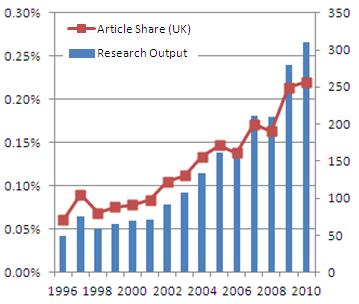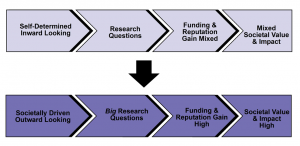 Are you a PGR student, research assistant or early career researcher working in the areas of engineering, biological and biomedical sciences, or physical sciences?
Are you a PGR student, research assistant or early career researcher working in the areas of engineering, biological and biomedical sciences, or physical sciences?
Then the SET for BRITAIN awards could be your opportunity to present your research to MPs at an exhibition in London in March 2012. The aim is for applicants to present their high level science research to a lay audience via a poster.
The overall aim of SET for BRITAIN is to encourage, support and promote Britain’s early-stage and early-career research scientists, engineers and technologists who are the “engine-room” of continued progress in and development of UK research and R&D, and ultimately of UK plc.
Early-stage researchers include university research students, postgraduates, research assistants, postdocs, research fellows, newly-appointed lecturers, part-time students and their equivalents in national, public sector and industrial laboratories, etc, and appropriate MSc students, all of whom are engaged in scientific, engineering, technological or medical research and are achieving results.
 On Monday 12th March SET for BRITAIN will hold a poster exhibition and reception in the House of Commons Terrace Marquee during National Science and Engineering Week. The exhibition will be of posters submitted by applicants to the SET for BRITAIN competition. The closing date for entries is Saturday 24 December 2011. There will be an initial selection by the judges and applicants will be informed by the end of January 2012 whether their application to take part in the exhibition has been successful.
On Monday 12th March SET for BRITAIN will hold a poster exhibition and reception in the House of Commons Terrace Marquee during National Science and Engineering Week. The exhibition will be of posters submitted by applicants to the SET for BRITAIN competition. The closing date for entries is Saturday 24 December 2011. There will be an initial selection by the judges and applicants will be informed by the end of January 2012 whether their application to take part in the exhibition has been successful.
In order to encourage maximum participation by early-career researchers and Members of Parliament the competition is divided into three distinct areas:
- Engineering
- Biological and Biomedical Science
- Physical Sciences (Chemistry and Physics)
Each section has a separate two-hour poster exhibition and judging session during the day, ending with a reception and prize-giving. It is expected that there will be about 60 posters on display in each session, representing the best in each field as part of a national competition for a prestigious Medal and substantial monetary prize.
A wide range of important scientific and engineering institutions are lending their support to this event, including the Society of Biology, the Institute of Physics, the Royal Academy of Engineering, and the Royal Society of Chemistry.
SET for BRITAIN Awards are made solely on the basis of the very best research work and results by an early-stage or early-career researcher. Prizes will be awarded for the scientific posters presented in each discipline which best communicate high level science to a lay audience.
To read a review about the event written by one of this year’s poster exhibitors, see Blanka Sengerova’s write up on the Vitae website.
This is a fantastic opportunity for BU staff and students to gain experience of communicating science with a lay audience and also for their research to make an impact on MPs.
For further information, including details on how to apply, visit the SET for BRITAIN website.
 The EU and Brazil have just signed a deal to launch a joint €10-million call for research proposals in Information and Communication Technologies.
The EU and Brazil have just signed a deal to launch a joint €10-million call for research proposals in Information and Communication Technologies. Welcome to RCUK Demand Management week on the blog! Today’s focus is on the Natural Environment Research Council (
Welcome to RCUK Demand Management week on the blog! Today’s focus is on the Natural Environment Research Council ( Good luck to Stuart Allan (MS) who has submitted quite a large bid to the BBC to undertake some research in the media coverage of conflict, Einar Thorsen (MS) for a small bid to the Association of Journalism Education to look at strategies for the use of news websites in journalism education, Edwin van Teijlingen (HSC) for submitting a capacity building partnership bid to THET, Eileen Wilkes (ApSci) for submitting a proposal to the British Academy small grants scheme to continue her research at Mount Folly, Ian Jones, Emma Kavanagh and Lorraine Brown (ST) for a joint bid to the British Academy, and to Lorraine Brown for a second bid to the British Academy. Good luck also to Janet Dickinson (ST), Heather Hartwell (ST/HSC) and Fabian Homberg (BS) each of whom has submitted a bid to the ESRC seminar series, Rosie Read (HSC) who has submitted two fellowship applications to research volunteering in the Czech Republic, and to Steve Calver and the MRG team (ST) who have submitted three bids to Dorset County Council
Good luck to Stuart Allan (MS) who has submitted quite a large bid to the BBC to undertake some research in the media coverage of conflict, Einar Thorsen (MS) for a small bid to the Association of Journalism Education to look at strategies for the use of news websites in journalism education, Edwin van Teijlingen (HSC) for submitting a capacity building partnership bid to THET, Eileen Wilkes (ApSci) for submitting a proposal to the British Academy small grants scheme to continue her research at Mount Folly, Ian Jones, Emma Kavanagh and Lorraine Brown (ST) for a joint bid to the British Academy, and to Lorraine Brown for a second bid to the British Academy. Good luck also to Janet Dickinson (ST), Heather Hartwell (ST/HSC) and Fabian Homberg (BS) each of whom has submitted a bid to the ESRC seminar series, Rosie Read (HSC) who has submitted two fellowship applications to research volunteering in the Czech Republic, and to Steve Calver and the MRG team (ST) who have submitted three bids to Dorset County Council

 Welcome to RCUK Demand Management week on the blog! Today’s focus is on the Economic and Social Research Council (
Welcome to RCUK Demand Management week on the blog! Today’s focus is on the Economic and Social Research Council ( Watch this excellent short video from BU’s
Watch this excellent short video from BU’s 





 The EPSRC has
The EPSRC has  Welcome to RCUK Demand Management week on the blog! Today’s focus is on the Engineering and Physical Sciences Research Council (
Welcome to RCUK Demand Management week on the blog! Today’s focus is on the Engineering and Physical Sciences Research Council (
 On Monday 12th March SET for BRITAIN will hold a poster exhibition and reception in the House of Commons Terrace Marquee during National Science and Engineering Week. The exhibition will be of posters submitted by applicants to the SET for BRITAIN competition. The closing date for entries is Saturday 24 December 2011. There will be an initial selection by the judges and applicants will be informed by the end of January 2012 whether their application to take part in the exhibition has been successful.
On Monday 12th March SET for BRITAIN will hold a poster exhibition and reception in the House of Commons Terrace Marquee during National Science and Engineering Week. The exhibition will be of posters submitted by applicants to the SET for BRITAIN competition. The closing date for entries is Saturday 24 December 2011. There will be an initial selection by the judges and applicants will be informed by the end of January 2012 whether their application to take part in the exhibition has been successful.

 The academics selected were chosen from a group of 57 finalists who attended a series of day-long workshops at the BBC exploring the key to making scholarly research into good programmes. They’ve gone on to work with BBC producers to develop their broadcasting ideas, contributed to Radio 3’s Free Thinking festival, made regular appearances on Radio 3’s arts and ideas programme Night Waves and pitched ideas for full length programmes based on their research.
The academics selected were chosen from a group of 57 finalists who attended a series of day-long workshops at the BBC exploring the key to making scholarly research into good programmes. They’ve gone on to work with BBC producers to develop their broadcasting ideas, contributed to Radio 3’s Free Thinking festival, made regular appearances on Radio 3’s arts and ideas programme Night Waves and pitched ideas for full length programmes based on their research. The Royal Society continues to support scientific discovery by allowing free access to more than 250 years of leading research. Their world-famous
The Royal Society continues to support scientific discovery by allowing free access to more than 250 years of leading research. Their world-famous 











 REF Code of Practice consultation is open!
REF Code of Practice consultation is open! BU Leads AI-Driven Work Package in EU Horizon SUSHEAS Project
BU Leads AI-Driven Work Package in EU Horizon SUSHEAS Project Evidence Synthesis Centre open at Kathmandu University
Evidence Synthesis Centre open at Kathmandu University Expand Your Impact: Collaboration and Networking Workshops for Researchers
Expand Your Impact: Collaboration and Networking Workshops for Researchers ECR Funding Open Call: Research Culture & Community Grant – Apply now
ECR Funding Open Call: Research Culture & Community Grant – Apply now ECR Funding Open Call: Research Culture & Community Grant – Application Deadline Friday 12 December
ECR Funding Open Call: Research Culture & Community Grant – Application Deadline Friday 12 December MSCA Postdoctoral Fellowships 2025 Call
MSCA Postdoctoral Fellowships 2025 Call ERC Advanced Grant 2025 Webinar
ERC Advanced Grant 2025 Webinar Update on UKRO services
Update on UKRO services European research project exploring use of ‘virtual twins’ to better manage metabolic associated fatty liver disease
European research project exploring use of ‘virtual twins’ to better manage metabolic associated fatty liver disease